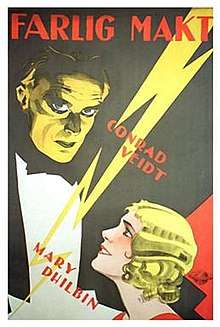The Last Performance
The Last Performance is a 1927[2] American horror film directed by Paul Fejos and starring Conrad Veidt and Mary Philbin. It was the last American silent film featuring Veidt before he returned to Germany. The film's working title was Erik the Great. Two versions were made - a silent version and Movietone version complete with music, talking sequences, and sound effects (the talking sequences were confined only to the last reel).[3]
| The Last Performance | |
|---|---|
 International theatrical release poster | |
| Directed by | Paul Fejos |
| Produced by | |
| Written by | Walter Anthony James Ashmore Creelman Tom Reed |
| Starring | Conrad Veidt Mary Philbin |
| Music by | Sam Perry |
Production company | |
| Distributed by | Universal Pictures |
Release date | 1927 (brief NY City premiere)[1]
|
Running time | 69 minutes |
| Country | United States |
| Language | English |
Historian Troy Howarth states "Originally planned as part of Universal's "Super Jewel" series, it was shot in 1927 and got a brief release that same year in New York City. It went into general release in 1929, just as sound films were beginning to catch on." He continues "Its belated general debut led many to conclude that Last Performance was a follow-up to Paul Leni's The Man Who Laughs (1928)....However, Fejos' film was made first."[1]
The silent version went into general release at the Little Carnegie Theater in New York City in November 1929. Later release prints contained sound effects, and the Hungarian release prints featured Bela Lugosi overdubbing Conrad Veidt's voice.[4] The Last Performance was shot on the same set as the 1925 film The Phantom of the Opera, and contained an early use of zoom effects. The film received mixed reviews. Troy Howarth states "An interesting rumor has circulated for years among film enthusiasts that Walter Brennan appears in the film as a circus clown, but this is difficult to confirm with any degree of certainty".[2]
The silent version (with Danish title cards) was released by the Criterion Collection on Blu-ray and DVD with Fejos' Lonesome in August 2012. The dvd release runs about 59 minutes, so "it seems likely that some significant footage is lost."[1]
Premise
Conrad Veidt stars as Erik the Great, a sinister stage magician who falls in love with a woman half his age, Julie, played by Mary Philbin. A young thief, Mark Royce (played by Fred MacKaye) is caught stealing from Erik's apartment and is taken in at Julie's suggestion. Secretly she falls in love with the new apprentice. However, Erik's other apprentice, Buffo (played by Leslie Fenton) becomes aware of Julie's love for Mark, and driven by jealousy tells Erik. Buffo is later found killed, and Mark is the prime suspect.
Cast
- Conrad Veidt as Erik the Great
- Mary Philbin as Julie Fergeron
- Leslie Fenton as Buffo Black
- Fred MacKaye as Mark Royce (credited as Fred Mac Kaye)
- Eddie Boland as Agent
- Anders Randolf as Judge
- Sam De Grasse as District Attorney
- Gusztáv Pártos as Theatre Manager (as Gustav Paros)
- William H. Turner as Booking Agent
- George Irving as Defense Attorney
Reception
The film received mixed reviews. While Photoplay wrote "Conrad Veidt as a magician in a much over-acted and over-directed film", The New York Times on 8 November 1929 wrote:
Director Fejos has handled his scenes with no small degree of imagination. Mr. Veidt's clever acting and Mary Philbin's captivating charm, this picture holds one's attention. Moreover, the narrative is developed with a certain force and skill. While some of the straight camera work is not up to scratch, there are a number of photographic feats that are quite effective. It is a picture that looks older than it really is, especially in the tinted portions where one goes from an amber interior scene to an azure blue night in the open.[5]
Home media
In 2012, The Criterion Collection included The Last Performance and a reconstructed sound version of Broadway as extra features on the DVD and Blu-ray release of Fejos' 1928 film, Lonesome.[6]
References
- Workman, Christopher; Howarth, Troy (2016). Tome of Terror: Horror Films of the Silent Era. Midnight Marquee Press. p. 314. ISBN 978-1936168-68-2.
- Workman, Christopher; Howarth, Troy (2016). Tome of Terror: Horror Films of the Silent Era. Midnight Marquee Press. p. 307. ISBN 978-1936168-68-2.
- http://www.silentera.com/PSFL/data/L/LastPerformance1929.html
- http://www.silentera.com/PSFL/data/L/LastPerformance1929.html
- John DeBartolo (2002). ""The Last Performance" (1929)". Retrieved 2006-07-20.
- "Lonesome". The Criterion Collection. Retrieved 2018-04-25.